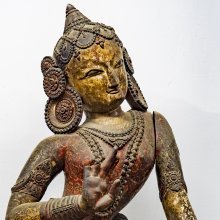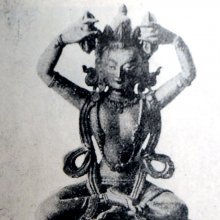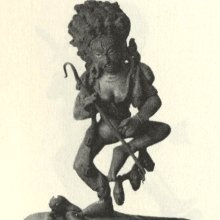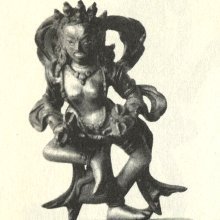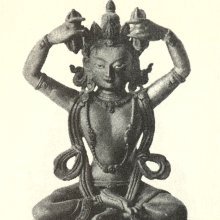Nritya, Nṛtyā, Nṛtya: 29 definitions
Introduction:
Nritya means something in Buddhism, Pali, Hinduism, Sanskrit, Marathi, Hindi. If you want to know the exact meaning, history, etymology or English translation of this term then check out the descriptions on this page. Add your comment or reference to a book if you want to contribute to this summary article.
Nritya has 28 English definitions available.
The Sanskrit terms Nṛtyā and Nṛtya can be transliterated into English as Nrtya or Nritya, using the IAST transliteration scheme (?).
Alternative spellings of this word include Nraty.
Images (photo gallery)
(+8 more images available)
Languages of India and abroad
Sanskrit dictionary
[Deutsch Wörterbuch]
Source: Cologne Digital Sanskrit Dictionaries: Böhtlingk and Roth Grosses Petersburger WörterbuchNṛtya (नृत्य):—(von nart) n. Tanz, Gebärdenspiel, Pantomime [Amarakoṣa 1, 1, 7, 10.] [Hemacandra’s Abhidhānacintāmaṇi 279. fg.] [Halāyudha 1, 93.] bhāvāśrayaṃ nṛtyam [DAŚAR. 1, 9.] nṛtyagīte [Kaṭhopaniṣad 1, 26.] [Indralokāgamana 3, 6.] [Sundopasundopākhyāna 4, 8.] [Mahābhārata 2, 2069.] [Harivaṃśa 9113.] [Rāmāyaṇa 1, 9, 8.] [Suśruta 1, 335, 9.] raṅgasya darśayitvā nivartate nartakī yathā nṛtyāt [SĀṂKHYAK. 59.] [Meghadūta 37.] pramodanṛtyaiḥ vārayoṣitām [Raghuvaṃśa 3, 19.] [Spr. 434.] [Varāhamihira’s Bṛhajjātaka S. 45, 17. 59, 15.] [BṚH. 17, 3. 26 (25), 9.] [Pañcatantra 187, 12.] gītavādyanṛtyabhedena [Madhusūdanasarasvatī’s Prasthānabheda] in [Weber’s Indische Studien 1, 22, 4.] nṛtyekṣaṇa [Amarakoṣa 3, 4, 29, 226.] nṛtyaṃ mayūrāḥ (vijahuḥ) [Raghuvaṃśa 14, 69.] [Meghadūta 33.]
--- OR ---
Nṛtya (नृत्य):—, nāṭyaṃ nṛtyaṃ tathā nṛttaṃ tredhā tat (nartanam) [Oxforder Handschriften 200,a,4.] unter den 64 Kalā [217,a,1.] nṛtyādhyāya [201,a, No. 479.] nirṇaya [No. 480.] nṛtya im ekstatischen Zustande der Pāśupata [SARVADARŚANAS. 77, 22. 78, 3.] — Vgl. mahā .
Source: Cologne Digital Sanskrit Dictionaries: Sanskrit-Wörterbuch in kürzerer FassungNṛtya (नृत्य):—n. Tanz , Gebärdenspiel , Pantomime.
Sanskrit, also spelled संस्कृतम् (saṃskṛtam), is an ancient language of India commonly seen as the grandmother of the Indo-European language family (even English!). Closely allied with Prakrit and Pali, Sanskrit is more exhaustive in both grammar and terms and has the most extensive collection of literature in the world, greatly surpassing its sister-languages Greek and Latin.
See also (Relevant definitions)
Starts with (+13): Nritya-bhoga, Nrityabhamgi, Nrityadhyaya, Nrityagana, Nrityagara, Nrityagati, Nrityagita, Nrityagitavadya, Nrityagite, Nrityagriha, Nrityahasta, Nrityajna, Nrityajne, Nrityaka, Nrityakala, Nrityakale, Nrityakunda, Nrityakundala, Nrityamamdira, Nrityamana.
Ends with (+32): Agninritya, Anamdanritya, Bandhanritya, Camatkaranritya, Caryanritya, Cindunritya, Dashavataranritya, Deshinritya, Dhadunritya, Dhrupadakhyanritya, Dhruvagitanritya, Dhruvanritya, Dipakanritya, Garbanritya, Gitanritya, Jhampanritya, Kalpanritya, Kattarinritya, Kuravamjinritya, Lilanritya.
Full-text (+105): Mandalanritya, Natta, Nacca, Nritta, Nrityasthana, Gitanritya, Nrityashala, Nrityahasta, Upanritya, Nrityashastra, Nrityapriya, Kalpanritya, Lilanritya, Natya, Rupakanritya, Mancanritya, Bandhanritya, Mahanritya, Nrtya kundala, Rudra Nritya.
Relevant text
Search found 42 books and stories containing Nritya, Nṛtyā, Nṛtya, Nrtya; (plurals include: Nrityas, Nṛtyās, Nṛtyas, Nrtyas). You can also click to the full overview containing English textual excerpts. Below are direct links for the most relevant articles:
Dasarupaka (critical study) (by Anuru Ranjan Mishra)
The description of rūpa, rūpaka, nāṭya, nṛtya and nṛtta < [Introduction]
Indian classical dramatic tradition < [Introduction]
Difference between the Daśarūpaka and the Nāṭyaśāstra < [Introduction]
Gati in Theory and Practice (by Dr. Sujatha Mohan)
Analysis of technical terms: Nāṭya, Nṛtta, Nṛtya < [Chapter 1 - Nāṭya]
References to drama, dance and music in Sanskrit literature < [Chapter 1 - Nāṭya]
Garga Samhita (English) (by Danavir Goswami)
Verse 3.1.26 < [Chapter 1 - The Worship of Śrī Girirāja]
Verse 6.5.17 < [Chapter 5 - The Kidnapping of Śrī Rukmiṇī]
Malatimadhava (study) (by Jintu Moni Dutta)
Part 3 - Art and Architecture in the Mālatīmādhava and 8th-century India < [Chapter 4 - Cultural Aspects of the Mālatīmādhava]
Abhinaya-darpana (English) (by Ananda Coomaraswamy)
Amarakoshodghatana of Kshirasvamin (study) (by A. Yamuna Devi)
Three types of Dance < [Chapter 4 - Cultural Aspects]

